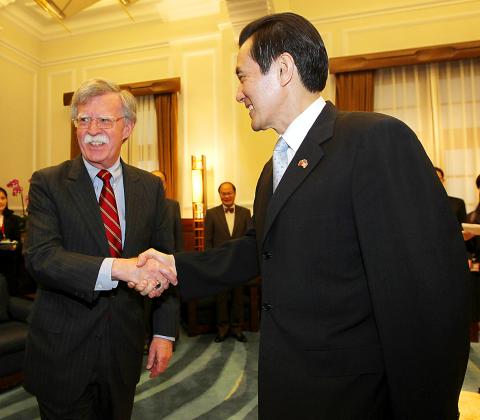A new report from the American Enterprise Institute (AEI) think tank concludes it is “increasingly likely” in a time of war that Chinese missiles would shut down Taiwan’s airfields, preventing Taipei from controlling the Taiwan Strait.
The missiles could also close US airfields in Japan, preventing the US from supporting Taiwan, the report says.
“Such capabilities would do much to influence US and allied decision making in a crisis short of conflict,” the report said.

Photo: CNA
A team of experts headed by former US deputy assistant secretary of defense Thomas Mahnken wrote the report, titled Asia in the Balance.
According to a US Department of Defense estimate cited by the report, China has between 1,300 and 1,800 ballistic and cruise missiles for land attack, including four nuclear and 10 conventional variants.
It also has deployed between 300 and 350 launchers for its missiles, most of which are mobile.
The report advises the US and its allies to confront China with the prospect that a war in Asia would — right from the start — involve many states.
“One of the most powerful ways to deter a conflict with China may be to convince the Beijing leadership that it would face a war in multiple theaters rather than one confined to the Taiwan Strait or the South China Sea,” the report says.
“The ability to compromise China’s sea lines of communication might prove a potent deterrent,” the report adds.
To deter and, if necessary, defeat China, the US military must be able to break a blockade around Taiwan, demine waters near the Strait and conduct wide-area antisubmarine warfare and offensive mining, the report says.
In addition, the Pentagon would need to neutralize at least some of China’s command, control, communications, computers, intelligence, surveillance and reconnaissance facilities, the report says.
It should, at the same time, hit “large numbers” of maritime and force-enabling Chinese People’s Liberation Army targets such as over-the-horizon radar and space-based surveillance.
“Aegis cruisers and destroyers should be able to provide simultaneous ballistic missile defense for [South] Korea, Japan and Taiwan,” the report says.
However, US naval air and missile defenses should be enhanced and the fleet enlarged sufficiently to allow the US Navy to project air power across China’s maritime frontier.
At the same time, the US Marine Corps should maintain a Marine Expeditionary Unit in the East and South China Seas for “speedy insertion into partner nations under attack.”
The report stresses that Taiwan could do much more than it has to enable itself to resist Chinese military coercion.
It should harden key military infrastructure — including its airfields and command and control nodes — against Chinese missile and air attacks.
Taipei should also invest in anti-ship cruise missiles, land-attack cruise missiles, diesel submarines and mine-laying capabilities that would allow the nation to “inflict costs on China, deter an amphibious attack and protract a conflict,” the report says.
The US must convince China that Beijing cannot fight and win a quick regional war, the report says.
“Complacency in the face of growing threats to US interests in the Asia-Pacific region will increase rather than decrease the possibility of conflict,” the report concludes.

Taipei has once again made it to the top 100 in Oxford Economics’ Global Cities Index 2025 report, moving up five places from last year to 60. The annual index, which was published last month, evaluated 1,000 of the most populated metropolises based on five indices — economics, human capital, quality of life, environment and governance. New York maintained its top spot this year, placing first in the economics index thanks to the strength of its vibrant financial industry and economic stability. Taipei ranked 263rd in economics, 44th in human capital, 15th in quality of life, 284th for environment and 75th in governance,

Greenpeace yesterday said that it is to appeal a decision last month by the Taipei High Administrative Court to dismiss its 2021 lawsuit against the Ministry of Economic Affairs over “loose” regulations governing major corporate electricity consumers. The climate-related lawsuit — the first of its kind in Taiwan — sought to require the government to enforce higher green energy thresholds on major corporations to reduce emissions in light of climate change and an uptick in extreme weather. The suit, filed by Greenpeace East Asia, the Environmental Jurists Association and four individual plaintiffs, was dismissed on May 8 following four years of litigation. The

A former officer in China’s People’s Liberation Army (PLA) who witnessed the aftermath of the 1989 Tiananmen Square massacre has warned that Taiwan could face a similar fate if China attempts to unify the country by force. Li Xiaoming (李曉明), who was deployed to Beijing as a junior officer during the crackdown, said Taiwanese people should study the massacre carefully, because it offers a glimpse of what Beijing is willing to do to suppress dissent. “What happened in Tiananmen Square could happen in Taiwan too,” Li told CNA in a May 22 interview, ahead of the massacre’s 36th anniversary. “If Taiwanese students or

The New Taipei City Government would assist relatives of those killed or injured in last month’s car-ramming incident in Sansia District (三峽) to secure compensation, Mayor Hou You-yi (侯友宜) said yesterday, two days after the driver died in a hospital. “The city government will do its best to help the relatives of the car crash incident seek compensation,” Hou said. The mayor also said that the city’s Legal Affairs, Education and Social Welfare departments have established a joint mechanism to “provide coordinated assistance” to victims and their families. Three people were killed and 12 injured when a car plowed into schoolchildren and their